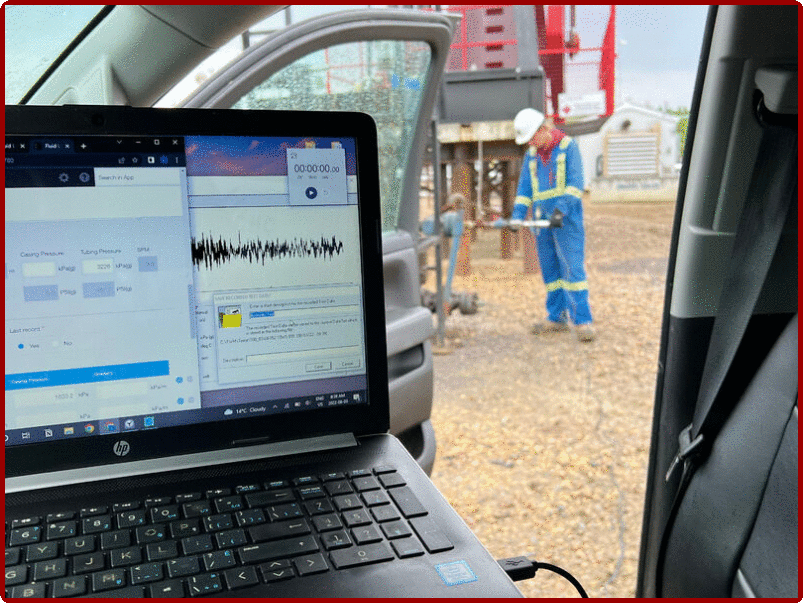Enhancing Well Optimization

Fluid level determination and annular fluid depression testing are crucial techniques for optimizing well performance in the oil and gas industry. Accurately determining fluid levels within the wellbore enables engineers to enhance production efficiency, protect equipment, and monitor reservoir behavior. Annular fluid depression testing offers enhanced accuracy and the ability to identify flow path restrictions, leading to targeted interventions. By leveraging these techniques, operators can make informed decisions, improve productivity, and ensure the long-term success of their oil and gas operations.
In the realm of well optimization, efficient and accurate fluid level determination plays a pivotal role in maximizing productivity and ensuring the overall performance of oil and gas wells. Fluid level determination helps engineers assess the state of fluids within the wellbore, enabling them to make informed decisions regarding production strategies and optimize well performance.
Importance of Fluid Level Determination:
- Production Efficiency: Fluid level determination provides valuable insights into the fluid composition and distribution within the wellbore. By accurately determining the fluid level, engineers can gauge the productive zone's depth and identify potential obstructions or malfunctions that may impede production. This information allows for targeted interventions and improved production efficiency.
- Equipment Protection: Fluid level determination helps prevent equipment damage by ensuring proper fluid coverage and lubrication. Knowing the precise fluid level within the well allows engineers to adjust pumping rates, preventing issues such as gas locking, cavitation, and excessive fluid levels that can strain equipment and compromise its longevity.
- Reservoir Monitoring: Understanding fluid levels facilitates accurate reservoir monitoring and characterization. By continuously tracking fluid levels, engineers can gain insights into reservoir dynamics, such as changes in pressure, fluid influx, and migration patterns. This knowledge aids in predicting reservoir behavior, optimizing production rates, and developing effective reservoir management strategies.
- Diagnostic Capabilities: Fluid level determination serves as a diagnostic tool for identifying wellbore conditions. Deviations in fluid levels may indicate anomalies such as leaks, mechanical failures, or the presence of formation water or unwanted fluids. Early detection of these issues through fluid level monitoring allows for prompt remedial actions, minimizing downtime and maximizing well productivity.
Advantages of Annular Fluid Depression Testing:
- Cost-Effective Testing: Annular fluid depression testing offers a cost-effective alternative to other testing methods. Unlike some conventional techniques that require extensive well shut-ins or wireline interventions, this method can be performed using wellbore fluids and existing production infrastructure. This eliminates the need for additional equipment, reduces operational downtime, and ultimately saves both time and money.
- Enhanced Accuracy: Annular fluid depression testing offers superior accuracy compared to traditional methods of fluid level determination. By isolating the annular space, this technique eliminates interference from other fluid columns within the well, leading to precise measurements of fluid levels and pressures.
- Identification of Flow Path Restrictions: Annular fluid depression testing can detect flow path restrictions such as partial blockages or inflow obstructions. By analyzing the pressure response during the depressurization process, engineers can identify the presence and location of these restrictions, enabling targeted remedial actions to restore optimal well performance.
- Determination of Reservoir Parameters: In addition to fluid level determination, annular fluid depression testing provides valuable information for reservoir characterization. By analyzing the pressure response during the depressurization process, engineers can derive reservoir parameters such as skin factor, formation permeability, and near-wellbore damage, aiding in reservoir management decisions and future development strategies.
Fluid level determination plays a crucial role in optimizing well performance and achieving maximum productivity. Accurate assessment of fluid levels within the wellbore enables engineers to make informed decisions, implement targeted interventions, and prevent equipment damage. Annular fluid depression testing further enhances fluid level determination by offering improved accuracy and diagnostic capabilities. By leveraging these techniques, engineers can optimize well production, reduce downtime, and ensure the long-term success of oil and gas operations.
Capable, Competitive, Experienced Optimization
Echo Optimization and Supervision is a rapidly growing optimization services company providing quality services at competitive rates to O & G companies across Alberta and Saskatchewan. For more information on our analysis and reporting services and our Pipeline Crossing Supervision, connect with our team by calling 1-403-895-0373 or filling out our contact form today.


